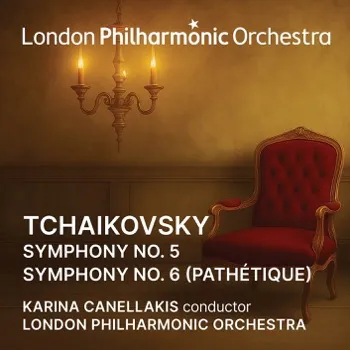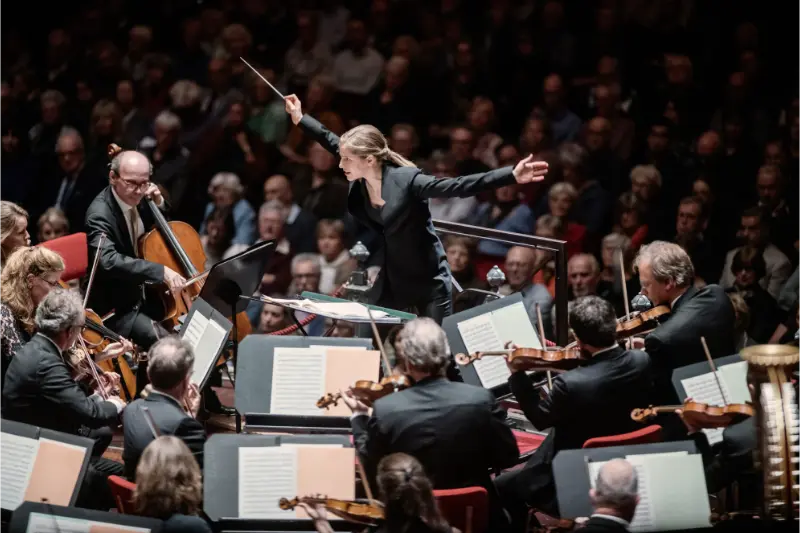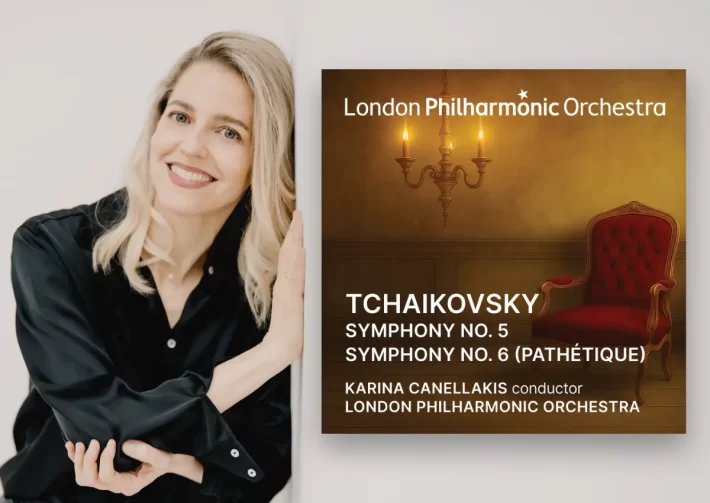I first heard Karina Canellakis’s work in 2023, reviewing her Bartók album with the Netherlands RPO on Pentatone. The recording impressed me, as did her more recent recording of Bartok’s “Bluebeard’s Castle.” Now comes an album with the London Philharmonic, where she has served as Principal Guest Conductor since 2021. The market is overflowing with recordings of these symphonies; in fact, the LPO label already recorded these Tchaikovsky symphonies, roughly a decade old, with their previous Music Director Vladimir Jurowski. Releasing another set of recordings surely indicates the high regard the orchestra has for Canellakis, and this new recording offers better engineering than the two Jurowski performances.

I must confess that my favorite readings of these symphonies could be described as ‘hyper-emotional,’ performances in which the music’s emotions are almost manic. They all use significant tempo differentiation, generous rubato and varying articulations to intensify the music’s rhetorical gestures. The brass roars, dominating at climaxes, while the overall sound has a thunderous weight Good examples of such approach are by Karajan in Berlin (DG) or Gergiev in Vienna (Decca). So, the technical perfection heard in the opening minute of the Fifth Symphony created a concern that clarity and unanimity of ensemble would be prioritized over emotional expression.
Yet it quickly became apparent that Canellakis inspires both technical brilliance and fiery intensity. Transparent textures let us hear much inner detail, especially from woodwinds, as the music reaches its first climax. Brass is not allowed to dominate but it still has plenty of presence. The music is driven forward, until Canellakis finally allows subtle relaxation for the second subject (5’30”). While the central climax (8’20”) is not as apocalyptic as Gatti with the Royal Philharmonic (Harmonia Mundi), it hits hard and rings emotionally true.
Gently melancholic strings set the stage for Andante’s gorgeous horn solo (frustratingly, the liner notes do not list the principal horn’s name, nor the player roster). Jurowski’s earlier LPO recording takes 11’38” but feels faster, at times overly brusque. That is never the case here – Canellakis instills a sense of urgency but still gives room for full emotional expression. And the playing never sounds routine: just listen to 5’16” (track 2) to hear how the LPO musicians really listen to and support one another. The sudden appearance of the fate motif (10’10”) has fearsome intensity, making us doubt that the quiet tenderness of the Coda is real.
The eloquence and grace of the Valse is a major strength of the entire performance: tempo changes feel organic, rubato is never mannered, and the playing has a ballet-like buoyancy that never comes at the expense of tonal heft. The Finale (11’36”) is faster than any recording mentioned above, yet it never feels rushed, because the playing has an intensity that commands our rapt attention. I appreciate that more sustained sound Canellakis calls for, even in moments of accented marcato. In Jurowski’s reading many of those same passages are played with shorter, punchy accents that grow tiring after a while.

Karina Canellakis (images: © Marco Borggreve)
The “Pathétique” is also very good. After a daringly long silence, the second theme is delivered with chaste gentleness (track 5, 4’35”). But in the Development, Canellakis holds the reigns too tightly – I wanted more wildness, and when the strings rear up at 13’00”, the wailing trombones must cut through the texture even more. (The music should feel like we stand at the very edge of an abyss.) Nevertheless, the second theme’s final statement has plenty of ardor.
The inner movements are in some way too beautiful: the fluency of the playing smooths out the limp of the 5/4 waltz, and the Vivace is too slow, overly smooth and sweet. Here it comes across as genuinely happy, where it should feel forced, even coerced. Under Pletnev (Russian National Orchestra / Warner) the final minutes are frenetic and unhinged; here, everything feels eminently civilized. The Finale is another matter, with Canellakis and the orchestra fully invested in its tragic trajectory. The last climax (track 8, 7’07”) has an agonizing intensity, the trombone threnody that follows unbearably sad.
While this new recording does not displace my favorites, it has made me think about the music anew. My ‘hyper-emotional’ favorites do take the struggle and tragedy of these works to a more universal, corporate level. Canellakis’s readings may suit listeners who like the tragedy and devastation in the music hinted rather than directly stated.
Recommended Comparisons
Jansons | Mravinsky | Karajan | Gergiev
Gatti (5) | Bernstein (6) | Ormandy (6) | Currentzis (6) | Pletnev (6) | Jurowski (5) | Jurowski (6)

Album Details |
|
|---|---|
| Album name | Tchaikovsky – Symphonies No. 5 & 6 (Pathétique) |
| Label | LPO |
| Catalogue No. | 0137 |
| Artists | London Philharmonic Orchestra, Karina Canellakis (conductor) |



















